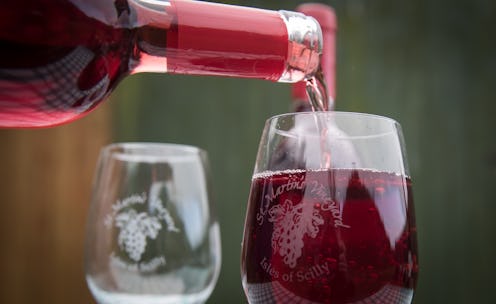Life
Here’s Why You Get A Migraine So Quickly After Drinking

If you get migraines, then you know how very dreadful they can be — and you're probably very on top of avoiding anything that could potentially bring one on. Seasoned migraineurs know that alcohol is a common migraine trigger, as a study published in the European Journal of Neurology confirms, but the link between drinking alcohol and migraine onset is a fascinating one.
In a study of 2,197 migraine patients, researchers found that almost 36 percent of study participants reported alcohol to be a migraine trigger. “We assessed alcoholic beverage consumption and self‐reported trigger potential, reasons behind alcohol abstinence and time between alcohol consumption and migraine attack onset,” the study’s authors say in the paper’s abstract.
Most patients reported that wine — especially red wine — was the most common migraine trigger where alcoholic drinks were concerned. But red wine only triggered migraine attacks in about nine percent of participants, according to a recent press release on the study. Researchers also found that the onset of a migraine post-alcohol consumption was fast, and typically took less than three hours in one-third of the study’s patients. Nearly 90 percent of patients got a migraine in under 10 hours, no matter what type of alcoholic drink they had before their headache started.
“Alcohol-triggered migraine occurs rapidly after intake of alcoholic beverages, suggesting a different mechanism than a normal hangover," lead study author, Dr. Gisela Terwindt, of the Leiden University Medical Center in the Netherlands said in the press release. And while alcohol does seem to significantly contribute to migraine symptoms in some people, more research is needed to understand why that is, and how that works, researchers say.
According to The American Migraine Foundation, migraine patients tend to drink less alcohol than people who don’t get migraines. Many migraine patients avoid red wine since it’s perceived as the main alcoholic migraine trigger, but studies don’t actually back this up yet. (There are actually more sulfites in white wine than red, the Wall Street Journal reports, but they're still not linked to headaches.) Any alcoholic beverage can cause migraines in some people, but one type of drink doesn’t seem to be worse than another as far as research goes, The American Migraine Foundation says. That said, many migraine patients identify their triggers over time, and causes of migraines can vary from person to person.
“Certain chemicals in alcohol, such as tyramine and histamine, are believed to act on chemicals in the brain, kicking off a series of events that leads to a migraine,” Migraine.com writes. “Because alcohol use can increase with stress, some researchers believe it is a combination of the alcohol and stress which sets migraine attack in motion.”
While more research is needed to fully understand why alcohol can exacerbate migraines in some people, it goes without saying that, if you do get migraines, it can be helpful to note your triggers. Jotting down what you ate and drank before you got a migraine, minimizing stress, and keeping track of your triggers over time, might help you minimize the frequency of your headaches.